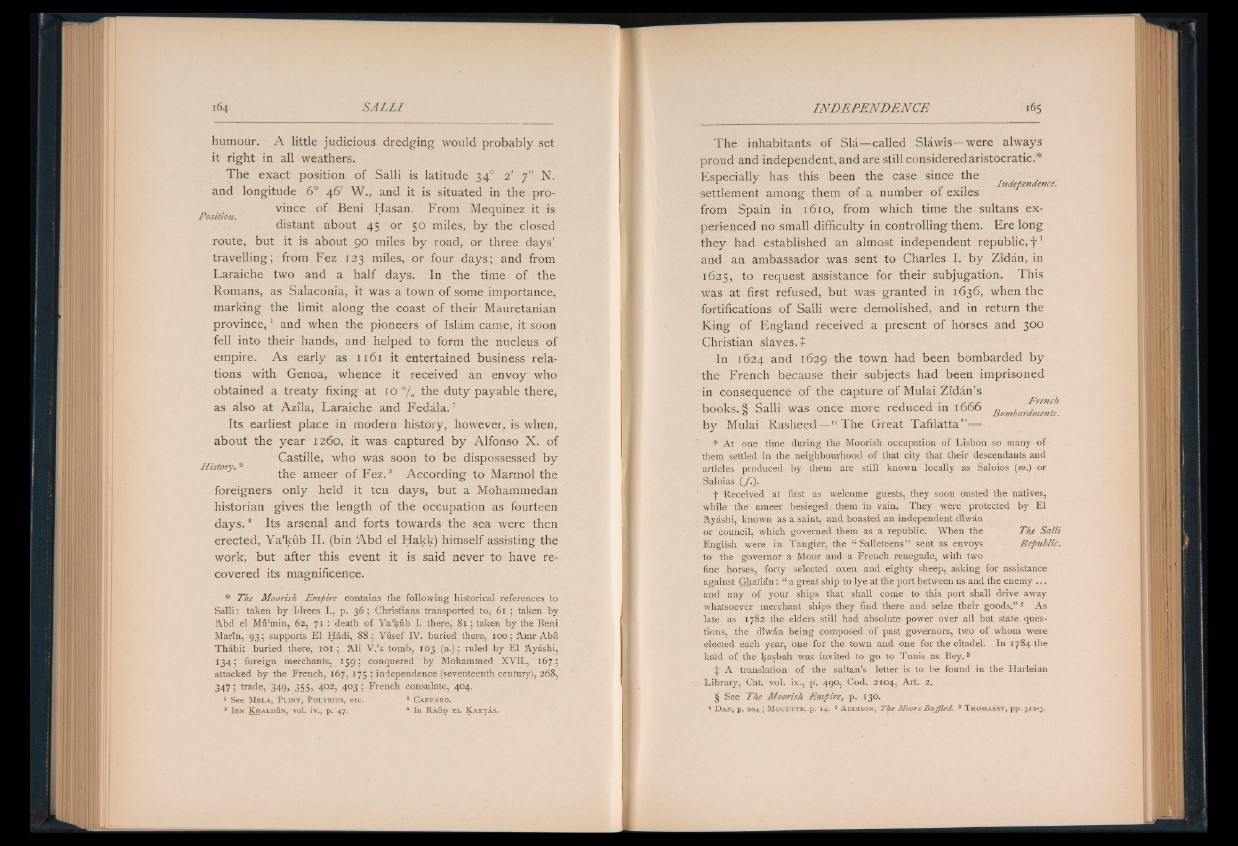
S A L I I
humour. A little judicious dredging would probably set
it right in all weathers.
The exact position of Salli is latitude 34° 2' 7" N.
and longitude 6° 46' W., and it is situated in the province
of Beni Hasan. From Mequinez it is
Position.
distant about 45 or 50 miles, by the closed
route, but it is about 90 miles by road, or three days’
travelling; from Fez 123 miles, or four days; and from
Laraiche two and a half days. In the time of the
Romans, as Salaconia, it was a town of some importance,
marking the limit along the coast of their Mauretanian
province,1 and when the pioneers of Islam came, it soon
fell into their hands, and helped to form the nucleus of
empire. As early as 1161 it entertained business relations
with Genoa, whence it received an envoy who
obtained a treaty fixing at 10 °/0 the duty payable there,
as also at Azila, Laraiche and Fedala. ’
Its earliest place in modern history, however, is when,
about the year 1260, it was captured by Alfonso X. of
Castille, who was soon to be dispossessed by
Histoty. ^
the ameer of F e z .3 According to Marmol the
foreigners only held it ten days, but a Mohammedan
historian gives the length of the occupation as fourteen
da y s.4 Its arsenal and forts towards the sea were then
erected, Y a ’kub II. (bin Abd el Hakk) himself assisting the
work, but after this event it is said never to have recovered
its magnificence.
* The Moorish Empire contains the following historical references to
Salli: taken by Irirees L, p. 36; Christians transported to, 61 ; taken by
Abd el Mu'min, 62, 71 : death of Ya3kub I. there, 81 5 taken by the Beni
Marin, 93; supports El Hadi, 88 5 Yusef IV. buried there, 1 0 0 5 Amr Abu
Thabit buried there, 101 ; Ali V.’s tomb, 103 (n.) 5 ruled by El Ayashi,
134; foreign merchants, 159; conquered by Mohammed XVII., 167;
attacked by the French, 167, 175 5 independence (seventeenth century), 268,
347; trade, 349, 355, 402, 403; French consulate, 404.
1 S e e M e l a , P l in y , P o l y b iu s , e t c . 2 C a f f a r o .
3 Ib n K h a l d u n , v o l. iv ., p . 47. k In R a o d e l K a r t a s .
IN D E PENDENCE
The inhabitants of Sla— called Slawis—were always
proud and independent, and are still considered aristocratic.*
Especially has this been the case since the _ • L J Independence.
settlement among them of a number of exiles
from Spain in 1610, from which time the sultans experienced
no small difficulty in controlling them. Ere long
they had established an almost independent rep ub lic ,!1
and an ambassador was sent to Charles I. by Zidan, in
1625, to request assistance for their subjugation. This
was at first refused, but was granted in 1636, when the
fortifications of Salli were demolished, and in return the
King of England received a present of horses and 300
Christian slaves.i
In 1624 and 1629 the town had been bombarded by
the French because their subjects had been imprisoned
in consequence of the capture of Mulai Zidan’s
books. § Salli was once more reduced in 1666 BombJ dZ2 ts.
by Mulai Rasheed— “ The Great Tafilatta” -r- .
* At one time during the Moorish occupation of Lisbon so many of
them settled in the neighbourhood of that city that their descendants and
articles produced by them are still known locally as Saloios (m.) or
Saloias (/".).
f Received at first as welcome guests, they soon ousted the natives,
while the ameer besieged them in vain. They were protected by El
Aydshi, known as a saint, and boasted an independent diwin
or council, which governed them as a republic. When the The Salli
English were in Tangier, the “ Salleteens” sent as envoys Republic.
to the governor a Moor and a French renegade, with two
fine horses, forty selected oxen and eighty sheep, asking for assistance
against Ghailan: “ a great ship to lye at the port between us and the enemy ...
and any of your ships that shall come to this port shall drive away
whatsoever merchant ships they find there and seize their goods.” 2 As
late as 1782 the elders still had absolute power over all but state questions,
the diwan being composed of past governors, two of whom were
elected each year, one for the town and one for the citadel. In 1784 the
kaid of the kasbah was invited to go to Tunis as Bey.s
f A translation of the sultan’s letter is to be found in the Harleian
Library, Cat. vol. ix., p\ 490, Cod. 2104, Art. 2.
§ See The Moorish Empire, p. 130.
1 D a n , p. 204 ; M o u e t t e , p. 14. 2 A d d i s o n , The Moors Baffled. 3 T h o m a s s y , pp. 312-3.